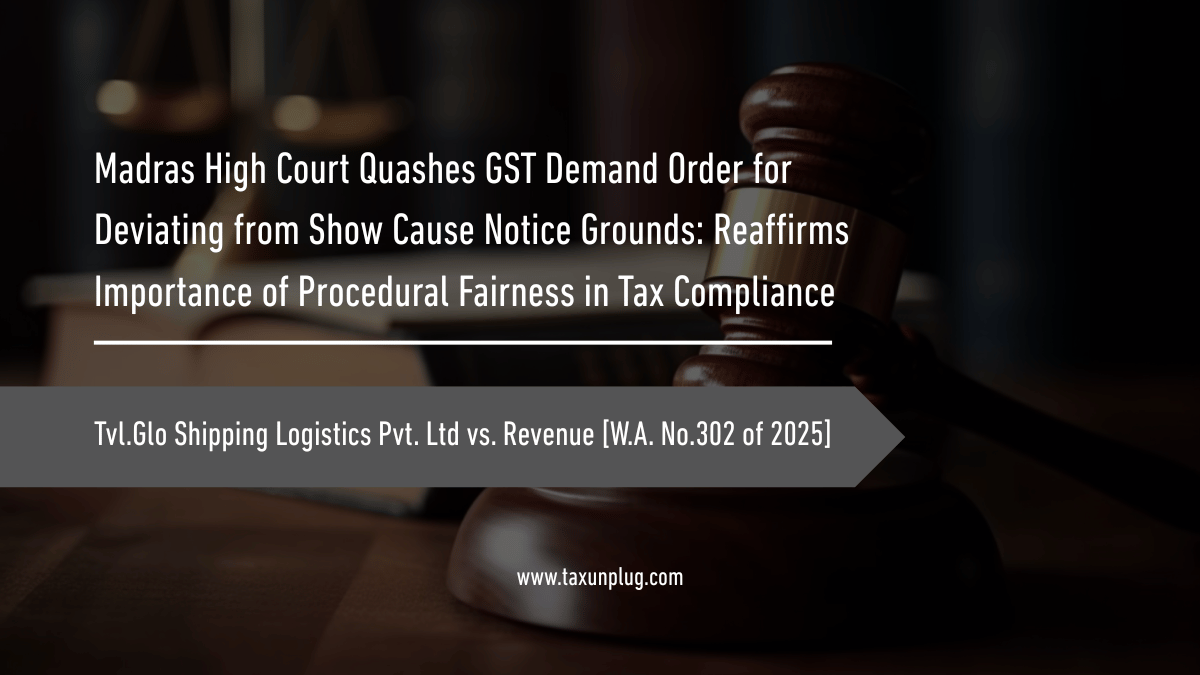Madras HC Quashes GST Order
Tvl.Glo Shipping Logistics Pvt. Ltd vs. Revenue [W.A. No.302 of 2025]
Background of the Case
The Appellant has received a show cause notice for the financial year 2019-20 proposing a demand of Rs. 21,77,261/- under Section 73 of the GST Act. However, after considering the appellant’s reply, the assessing authority passed an order dated 31.08.2024 demanding Rs. 98,83,029/- – nearly five times the amount mentioned in the initial notice. The appellant challenged this order before the Madras High Court contending that the final demand exceeded the amount specified in the show cause notice, violating Section 75(7) of the GST Act
Arguments by the Appellant
The appellant argued that the impugned order suffered from jurisdictional error as it introduced completely new grounds not part of the original show cause notice. The appellant emphasized that Section 75(7) expressly prohibits tax authorities from making demands beyond the grounds specified in the notice. Regarding the Single Judge’s remand order, the appellant contended that the condition restoring the original demand if reply wasn’t filed within three weeks was unduly harsh and deprived them of a meaningful opportunity to contest.
Respondent’s Response
The respondent, Revenue contended that the appellant’s own business records and submissions during the assessment proceedings had revealed crucial information about their operational model. These disclosures, according to the respondent, clearly established that the appellant was functioning as an “Intermediary”. Further the respondent argued that the provision of section 75(7) only prohibits demands on entirely new grounds not contemplated in the notice. The respondent highlighted that the Single Judge’s remand order itself served as an adequate safeguard. They stressed that the three-week response window was standard procedure in GST matters and couldn’t be considered unreasonably short,
Court Findings and Decision
The Madras High Court, held that statutory mandate of Section 75(7) of the GST Act, which expressly prohibits revenue authorities from making demands on grounds not specified in the original show cause notice. The Bench observed that the department’s attempt to classify the appellant as an “Intermediary” constituted a completely new cause of action rather than a mere expansion of the original allegations. The Court expressed grave concerns about the automatic restoration clause, noting that such provisions create an unfair “Sword of Damocles” situation for appellant.
Court extended the response period from three to four weeks, providing more reasonable compliance time and expressly permitted the appellant to raise all substantive defenses including limitation and jurisdictional challenges. The Court directed the assessing officer to consider the reply afresh without being influenced by earlier proceedings
To download official order, Click Here
“The site is for information purposes only and does not provide legal advice of any sort. Viewing this site, receipt of information contained on this site, or the transmission of information from or to this site does not constitute an attorney-client relationship. The information on this site is not intended to be a substitute for professional advice.”

